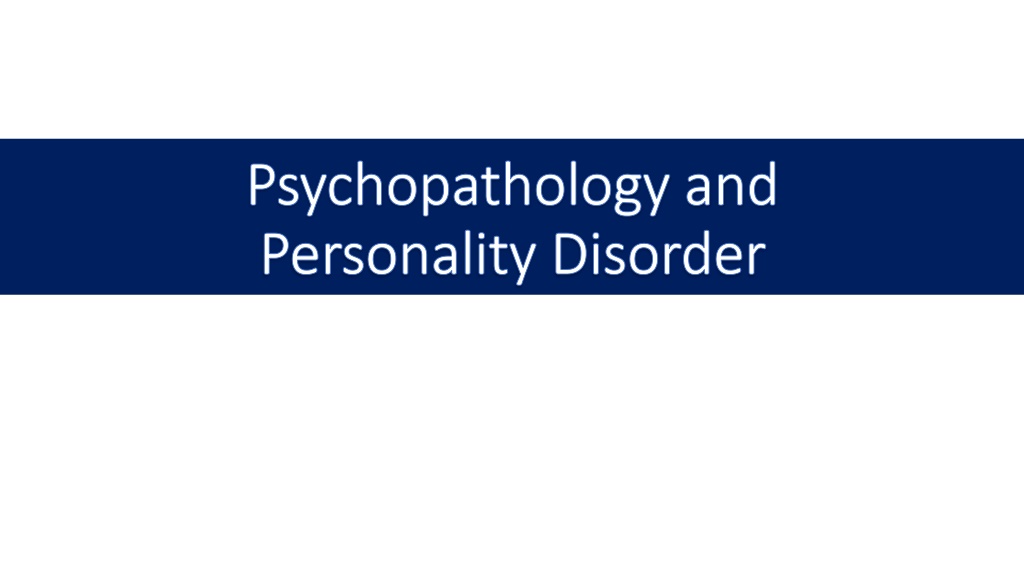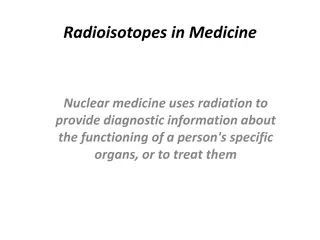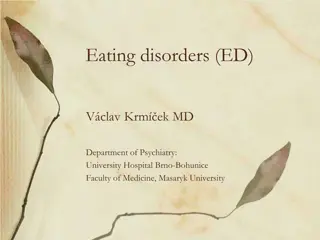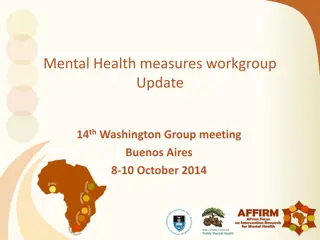Understanding Psychopathology and Diagnostic Systems in Mental Health
Psychopathology encompasses the study of mental illness and distress, with psychiatrists and clinical psychologists deeply involved in diagnosis and treatment. Signs of psychopathology can include mood changes, excessive worry, and withdrawal from activities. Diagnostic systems like DSM-5, ICD-11, and RDoC play crucial roles in defining and categorizing mental health conditions for effective treatment and research.
Download Presentation

Please find below an Image/Link to download the presentation.
The content on the website is provided AS IS for your information and personal use only. It may not be sold, licensed, or shared on other websites without obtaining consent from the author. Download presentation by click this link. If you encounter any issues during the download, it is possible that the publisher has removed the file from their server.
E N D
Presentation Transcript
Psychopathology and Psychopathology and Personality Disorder Personality Disorder
What is Psychopathology ? What is Psychopathology ? Psychopathology is a term which refers to either the study of mental illness or mental distress or the manifestation of behaviours and experiences which may be indicative of mental illness or psychological impairment. Psychiatrists and clinical psychologists are particularly interested in this area and may either be involved in clinical treatment of mental illness, or research into the origin, development and manifestations of such states, or often, both.
Significance Significance This is both for the diagnosis of individual patients (to see whether the patient's experience fits any pre-existing classification), or for the creation of diagnostic systems (such as the Diagnostic and Statistical Manual of Mental Disorders) which define exactly which signs and symptoms should make up a diagnosis, and how experiences and behaviours should be grouped in particular diagnoses (e.g. clinical depression, schizophrenia). Can include a long list of elements: symptoms, behaviours, causes (genetics, biology, social, psychological), course, development, categorization, treatments, strategies, and more.
Some of the signs that a person might be experiencing some form of psychopathology include: Changes in eating habits Changes in mood Excessive worry, anxiety, or fear Feelings of distress Inability to concentrate Irritability or anger Low energy or feelings of fatigue Sleep disruptions Thoughts of self-harm or suicide Trouble coping with daily life Withdrawal from activities and friends
Diagnostic Systems Diagnostic Systems Diagnostic and Statistical Manual of Mental Disorders (DSM) : created by the American Psychiatric Association (APA) as an assessment system for mental illness. The DSM-5 published in 2013 is the current edition and includes identifiable criteria that mental health professionals use to arrive at a specific diagnosis International Classification of Diseases (ICD) : ICD-11 is produced by a global agency to reduce the burden of disease globally. It includes medical as well as mental health diagnoses. It is freely available on the Internet. Research Domain Criteria (RDoC) : RDoC is involved in describing the signs and symptoms of psychopathology rather than grouping them into disorders as has been historically done with the DSM and ICD.
Identifying Psychopathology Identifying Psychopathology Psychiatric disorders can be conceptualized as referring to problems in four areas: deviance, distress, dysfunction, and danger.4 Deviance: This term refers to thoughts, emotions, or behaviours that deviate from what is common or at odds with what is deemed acceptable in the society. In the case of depression, you might report thoughts of guilt or worthlessness that are not common among other people. Distress: This symptom refers to negative feelings either felt within a person or that result in discomfort in others around that person. In the case of depression, you might report extreme feelings of distress over sadness or guilt. Dysfunction: With this symptom, professionals are looking for the inability to achieve daily functions like going to work. In the case of depression, you might report that you can't get out of bed in the morning or that daily tasks take you much longer than they should. Danger: This term refers to behaviour that might put you or someone else at some type of detrimental risk. In the case of depression, this could include reporting that you are having thoughts of suicide or harming yourself.
Causes Causes There a number of factors that can increase the risk of mental illness, including: Biological factors, including genes and brain chemistry Chronic medical conditions Family members with mental illness Feelings of isolation Lack of social support Substance or alcohol use Traumatic or stressful experiences
Personality Disorders Personality Disorders Personality is the way of thinking, feeling and behaving that makes a person different from other people. An individual s personality is influenced by experiences, environment (surroundings, life situations) and inherited characteristics. A personality disorder is a way of thinking, feeling and behaving that deviates from the expectations of the culture, causes distress or problems functioning, and lasts over time. Personality disorders are a group of mental illnesses. They involve long-term patterns of thoughts and behaviors that are unhealthy and inflexible. The cause of personality disorders is unknown. However, genes and childhood experiences may play a role. The symptoms of each personality disorder are different. They can mild or severe. People with personality disorders may have trouble realizing that they have a problem. To them, their thoughts are normal, and they often blame others for their problems. They may try to get help because of their problems with relationships and work. Treatment usually includes talk therapy and sometimes medicine.
Personality disorders affect at least two of these areas: Way of thinking about oneself and others Way of responding emotionally Way of relating to other people Way of controlling one s behaviour
Personality Disorders DSM 5 Cluster A : Odd or eccentric behaviour. People with cluster A personality disorders tend to experience major disruptions in relationships because their behaviour may be perceived as peculiar, suspicious, or detached. Cluster B : Dramatic or erratic behaviour. Individual tend to either experience very intense emotions or engage in extremely impulsive, theatrical, promiscuous, or law-breaking behaviours. Cluster C : Anxiety. People with personality disorders in this cluster tend to experience pervasive anxiety and/or fearfulness. Paranoid Personality Disorder Schizoid Personality Disorder Antisocial Personality Disorder Avoidant Personality Disorder Obsessive- compulsive personality disorder Paranoid Personality Disorder Schizoid Personality Disorder Schizotypal personality disorder Antisocial Personality Disorder Borderline Personality Disorder Histrionic Personality Disorder Narcissistic Personality Disorder Avoidant Personality Disorder Dependant Personality Disorder
Paranoid Personality Disorder Paranoid Personality Disorder Symptoms include chronic, pervasive distrust of other people, suspicion of being deceived or exploited by others, including friends, family, and partners. Often assume people will harm or deceive them and don t confide in others or become close to them. Are at a greater risk of experiencing depression, substance abuse, and agoraphobia. Other symptoms of paranoid personality disorder include: Feelings that they are being lied to, deceived, or exploited by other people May believe that friends, family, and romantic partners are untrustworthy and unfaithful Outbursts of anger in response to perceived deception Often described as cold, jealous, secretive, and serious Overly controlling in relationships in order to avoid being exploited or manipulated Look for hidden meanings in gestures and conversations Find it difficult to relax Often hold negative views of other people Overly sensitive to criticism Overreacts in response to perceived criticism
Schizoid Personality Disorder Schizoid Personality Disorder Detached from social relationships and expressing little emotion. A person with schizoid personality disorder typically does not seek close relationships, chooses to be alone (social isolation) and seems to not care about praise or criticism from (indifference). They find it difficult to express emotions and lack the desire to form close personal relationships. May find it easier to form relationships that center on intellectual, occupational, or recreational pursuits because such relationships do not rely on emotional intimacy. People with schizoid personality disorder typically experience: A preoccupation with introspection and fantasy A sense of indifference to praise and affirmation, as well as to criticism or rejection Detachment from other people Little or no desire to form close relationships with others Indifference to social norms and expectations Infrequent participation in activities for fun or pleasure Not enjoying social or family relationships Often described as cold, uninterested, withdrawn, and aloof
Schizotypal personality disorder Schizotypal personality disorder Very uncomfortable in close relationships, having distorted thinking and eccentric behavior. A person with schizotypal personality disorder may have features odd speech, behavior, and appearance, as well as strange beliefs and difficulty forming relationships. Schizotypal personality disorder typically includes five or more of these signs and symptoms: strange thinking or behavior unusual beliefs discomfort in social situations a lack of emotion or inappropriate emotional responses odd speech that may be vague or rambling a lack of close friends extreme social anxiety paranoia
Antisocial Personality Disorder Lack of empathy and regard for other people, have little or no regard for right or wrong. They antagonize and often act insensitively or in an unfeeling manner. A person with antisocial personality disorder may not conform to social norms, may repeatedly lie or deceive others, or may act impulsively and participate in criminal activity. In order to be diagnosed with ASPD, a person must display a disregard and violation of the rights of others before the age of 15. People with antisocial personality disorder: May begin displaying symptoms during childhood; such behaviors may include fire setting, cruelty to animals, and difficulty with authority Often have legal problems resulting from failures to conform to social norms and a lack of concern for the rights of others Often act out impulsively and fail to consider the consequences of their actions Display aggressiveness and irritability that often lead to physical assaults Lack empathy, lack of remorse for damaging behavior Often have poor or abusive relationships with others and are more likely to abuse or neglect their children Frequently lie and deceive others for personal gain
Borderline Personality Disorder Instability in personal relationships, intense emotions, poor self-image and impulsivity. A person may go to great lengths to avoid being abandoned, have repeated suicide attempts, display inappropriate intense anger or have ongoing feelings of emptiness. It's associated with specific and significant problems in interpersonal relationships, self-image, emotions, behaviours, and thinking, including: Behaviours: Tendency to engage in risky and impulsive behaviours, such as drinking excessive amounts of alcohol or abusing drugs, . More prone to engage in self-harming behaviours, such as cutting or burning and attempting suicide. Emotions: emotional instability is a key feature of bpd. Individuals feel like they're on an emotional roller coaster with quick mood shifts (i.E., Going from feeling OK to feeling extremely down or blue within a few minutes). Mood changes can last from minutes to days and are often intense. Anger, anxiety, and overwhelming emptiness are common as well. Relationships: intense relationships with loved ones characterized by frequent conflicts, arguments, and break-ups. Associated with an intense fear of being abandoned by loved ones and attempts to avoid real or imagined abandonment. This usually leads to difficulty trusting others, putting a strain on relationships. Self-image: difficulties related to the stability of their sense of self. One moment they may feel good about themselves, but the next they may feel they are bad or even evil. Stress-related changes in thinking: under stress, people may experience changes in thinking, including paranoid thoughts or feeling spaced out, numb, or like they're not really in their body.
Histrionic Personality Disorder Extreme emotionality and attention-seeking behaviour that often leads to socially inappropriate behavior in order to get attention. Begins by early adulthood and is obvious in different situations. One must have five or more of the following signs or symptoms to be diagnosed with HPD: Discomfort in situations in which you're not the centre of attention Interaction with others that's often characterized by inappropriate sexually seductive or provocative behaviour Rapidly shifting and shallow expression of emotion Consistently uses physical appearance to draw attention to self Style of speech that is excessively impressionistic and lacking in detail Shows self-dramatization, theatricality, and exaggerated expression of emotion Is easily influenced by others or by circumstances Considers relationships to be more intimate than they actually are
Narcissistic Personality Disorder A person with narcissistic personality disorder may have a grandiose sense of self-importance, a sense of entitlement, take advantage of others or lack empathy. Very self-absorbed or egotistical. Narcissistic personality disorder is characterized by the presence of min. five of the following symptoms: Has an inflated sense of self-importance Is preoccupied with fantasies of success, power, brilliance, beauty, or ideal love Believes that he or she is special and can only be understood by other special or high-status people Requires excessive admiration Possesses a sense of entitlement Takes advantage of others Lacks empathy Is often envious of others or believes others are envious of him or her Behaves in an arrogant, egotistical, or haughty way
Avoidant Personality Disorder Extreme shyness, feelings of inadequacy and extreme sensitivity to criticism. People with avoidant personality disorder may be unwilling to get involved with people unless they are certain of being liked, be preoccupied with being criticized or rejected, or may view themselves as not being good enough or socially inept. The following is a list of common symptoms associated with avoidant personality disorder: Avoidance of occupational activities involving significant social contact out of fear of criticism, disapproval, or rejection Unwillingness to become involved with others unless you are certain that they will like you Holding back in intimate relationships out of fear of being ridiculed or humiliated Preoccupation with criticism or rejection in social situations Inhibition in new social situations due to feeling inadequate Feelings of being socially inept, unappealing, or inferior to others Hesitation to take risks or do new things out of fear of embarrassment
Dependent Personality Disorder Involves fear of being alone and often causes those who have the disorder to do things to try to get other people to take care of them. Pattern of needing to be taken care of and submissive and clingy behaviour. May have difficulty making daily decisions without reassurance from others or may feel uncomfortable or helpless when alone because of fear of inability to take care of themselves. Common symptoms include: Fear of being alone Avoiding taking initiative or responsibility Sensitivity to criticism Lack of opinions
Obsessive-compulsive Personality Disorder Strict orderliness, control, and perfectionism. Someone with OCPD will likely try to stay in charge of the smallest details of their life, even at the expense of their flexibility and openness to new experiences. Someone with OCPD may experience symptoms like:3 Acting restrained or restricted with their emotions Adherence to rules in an inflexible, rigid way Creating order and lists for tasks Desire to control their relationships with others Difficulty empathizing with others and/or maintaining intimate relationships Extreme dedication to their work Having trouble giving things to others Need for perfection even in the smallest details Problems with self-identity and/or self-direction Trouble giving up control and delegating tasks
References https://www.sciencedaily.com/terms/psychopathology.htm https://www.verywellmind.com/an-overview-of-psychopathology- 4178942























